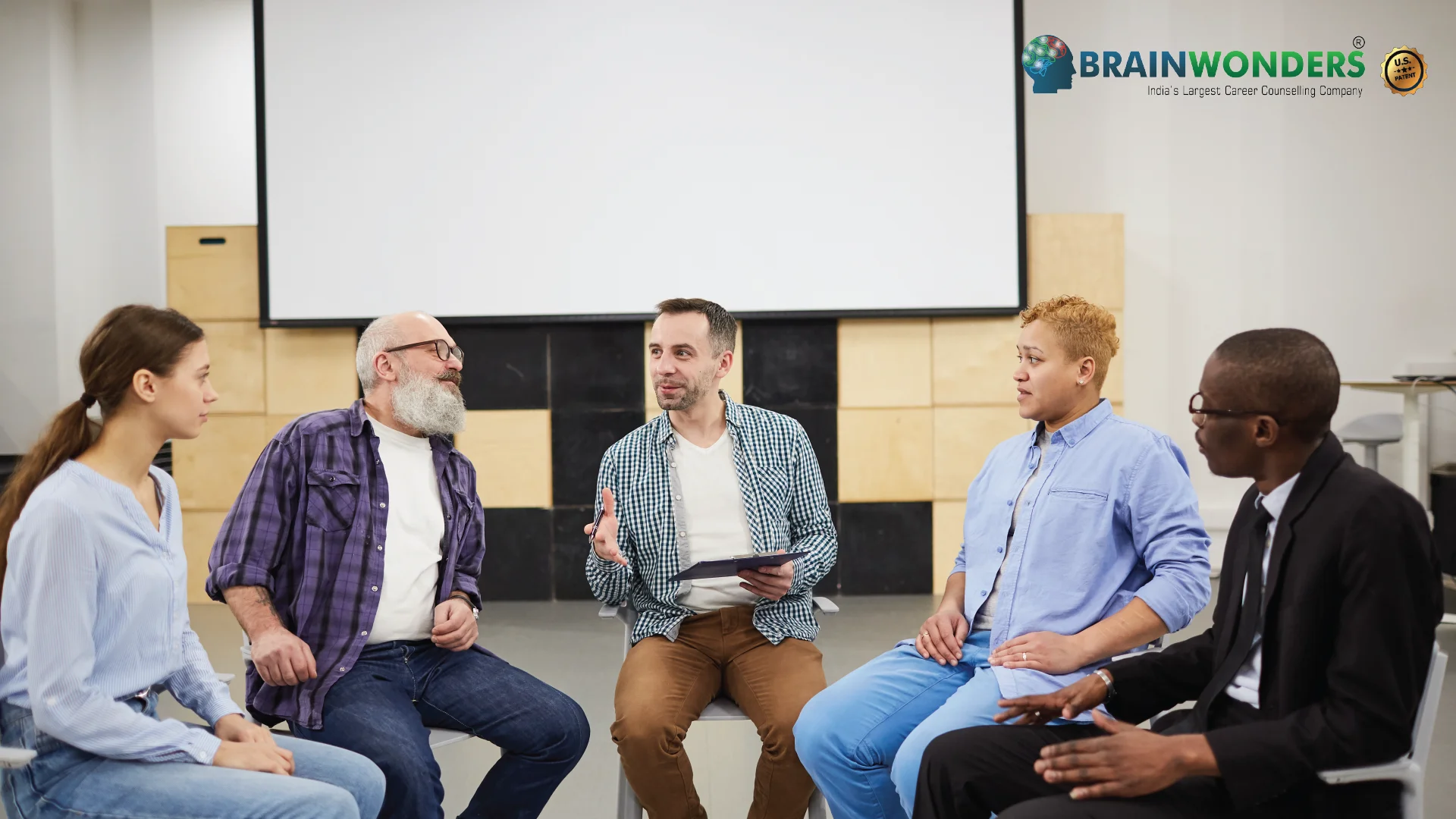How to become a Rehabilitation Counselor
Overview, Courses, Exam, Colleges, Pathways, Salary

Overview
Who is Rehabilitation Counselor ?
A Rehabilitation Counselor is a trained professional who assists individuals with physical, emotional, or cognitive disabilities to regain independence and improve their overall quality of life. They work in various settings, including hospitals, rehabilitation centres, government agencies, and private practice.
Rehabilitation Counselors evaluate clients' abilities and limitations, develop personalized treatment plans, and provide counselling to address emotional and psychological challenges related to their disabilities. They may also collaborate with medical professionals, social workers, and vocational experts to create comprehensive rehabilitation programs.
The goal of a Rehabilitation Counselor is to empower clients to overcome obstacles, develop necessary skills, and find suitable employment or education opportunities. They may assist with job placement and vocational training and help individuals navigate social and community resources to support their successful reintegration into society. Rehabilitation Counselors are vital in facilitating the physical, emotional, and social recovery of individuals with disabilities, promoting their independence and inclusion in the community.
Typical day at work
What does Rehabilitation Counselor do?
A Rehabilitation Counselor performs various essential duties to support individuals with disabilities or impairments to achieve their maximum potential for independence, self-sufficiency, and overall well-being. Some of the key responsibilities and tasks of a Rehabilitation Counselor include:
- Assessment: Conduct thorough inspections of clients' physical, emotional, and cognitive abilities to identify their strengths, limitations, and rehabilitation needs.
- Individualized Treatment Planning: Developing personalized rehabilitation plans tailored to each client's unique needs and goals.
- Counselling: Providing counselling and emotional support to help clients cope with the challenges associated with their disabilities and adjust to their new circumstances.
- Career and Vocational Guidance: Assisting clients in identifying suitable career paths, exploring vocational training opportunities, and finding employment that aligns with their abilities.
- Skills Training: Delivering training sessions to enhance clients' functional abilities and teach them adaptive techniques for daily living, communication, and mobility.
- Advocacy: Advocating for clients to ensure access to necessary services, accommodations, and resources in their communities.
- Case Management: Coordinating services and resources, including medical care, social services, and educational support, to facilitate the client's rehabilitation journey.
- Collaboration: Working closely with medical professionals, social workers, educators, and employers to create a comprehensive client support network.
- Assistive Technology: Recommending and providing training on using assistive devices and technologies that can enhance clients' independence and mobility.
- Job Placement: Assisting clients with resume preparation, job searching, interview skills, and job placement to enable successful integration into the workforce.
- Community Integration: Facilitating community involvement and encouraging participation in recreational, social, and civic activities to promote clients' inclusion and social connections.
- Progress Monitoring: Regularly evaluating clients' progress and adjusting rehabilitation plans as needed to ensure the best outcomes.
Abilities and Aptitude needed
What are the skills, abilities & aptitude needed to become Rehabilitation Counselor?
To become an effective Rehabilitation Counselor, individuals need diverse abilities, skills, and aptitudes to provide comprehensive support and empower individuals with disabilities. Here are some key attributes that are important for aspiring Rehabilitation Counselors:
- Empathy and Compassion: Rehabilitation Counselors must genuinely understand the challenges faced by individuals with disabilities and be compassionate in their approach to providing support and guidance.
- Active Listening: Effective communication is essential, and active listening helps counsellors understand clients' needs, concerns, and goals better.
- Assessment and Evaluation: The ability to conduct thorough inspections and evaluations of clients' capabilities and limitations is critical in developing personalized rehabilitation plans.
- Counselling Skills: Strong counselling skills are crucial for providing emotional support, helping clients cope with their disabilities, and assisting them in adjusting to life changes.
- Problem-Solving: Rehabilitation Counselors must be skilled at identifying challenges and finding practical solutions to help clients overcome obstacles and achieve their rehabilitation goals.
- Knowledge of Disabilities and Conditions: In-depth knowledge of various disabilities, medical conditions, and their implications is essential for designing appropriate rehabilitation programs.
- Collaboration and Interdisciplinary Teamwork: Rehabilitation Counselors often work with medical professionals, educators, social workers, and employers. Collaborative skills are vital to coordinating services effectively.
- Cultural Competence: Being culturally sensitive and aware of diverse backgrounds and experiences helps counsellors provide tailored support and respect individual preferences.
- Advocacy: Rehabilitation Counselors may need to advocate on behalf of their clients to ensure they have access to necessary resources and accommodations.
- Patience and Resilience: Working with individuals facing challenges requires patience and resilience to support clients throughout their rehabilitation journey.
- Adaptability: Each client's rehabilitation needs may vary, so counsellors must be adaptable in tailoring their approach and strategies.
- Teaching and Training Skills: Rehabilitation Counselors often provide skills training to clients, so the ability to impart knowledge effectively is essential.
- Ethical Conduct: Upholding ethical standards is essential in maintaining client confidentiality and providing professional and trustworthy services.
- Motivational Skills: Helping clients stay motivated and committed to their rehabilitation goals is crucial for successful outcomes.
- Resourcefulness: Resourcefulness in identifying and accessing appropriate community resources and services benefits clients' overall support.
Salary
Salary for Rehabilitation Counselor?
Salary for Rehabilitation Counselor in India:
- Minimum Monthly Salary: For entry-level Rehabilitation Counselors or those with limited experience, the monthly salary might be around INR 20,000 to INR 30,000.
- Maximum Monthly Salary: Highly experienced and senior-level Rehabilitation Counselors, especially those working in reputable healthcare institutions or government agencies, may earn a maximum monthly salary ranging from INR 50,000 to INR 70,000 or more.
- Annual Salary: The annual salary for entry-level Rehabilitation Counselors could be approximately INR 2.4 lakhs to INR 3.6 lakhs per year. Experienced and well-qualified Rehabilitation Counselors may earn a maximum annual salary ranging from INR 6 lakhs to INR 8.4 lakhs or more.
- Highest-Paying Jobs and Scope: The highest-paying jobs for Rehabilitation Counselors in India are typically with well-established rehabilitation centers, large hospitals, and specialized healthcare facilities. Rehabilitation Counselors who demonstrate strong counseling skills, possess expertise in dealing with various disabilities, and work in high-demand areas like mental health rehabilitation or geriatric care can command higher salaries and may have opportunities for career growth into supervisory or management roles. With the increasing focus on disability support and mental health awareness in India, the career scope for Rehabilitation Counselors is promising. There is a growing demand for skilled professionals who can provide specialized care to individuals with disabilities and contribute to enhancing their quality of life and overall well-being.
Pathways
How to become an Rehabilitation Counselor?
Entrance Exam
Entrance Exam for Rehabilitation Counselor ?
It is mandatory as per the RCI Act of 1992, that core faculty members are registered professionals of RCI under the category of “Rehabilitation Psychologist”.
Courses
Which course I can pursue?
Best Colleges
Which are the best colleges to attend to become an Rehabilitation Counselor?
Industries
Which Industries are open for Rehabilitation Counselor?
- Elementary and Secondary Schools
- Prisons
- Juvenile Centres or Foster Homes
- Insurance companies
- Independent-living facilities.
- NGO’s and NPO’s
- Deaddiction Centres
- Colleges and Universities
- Military/Defence Camps
internship
Are there internships available for Rehabilitation Counselor?
Internships for Rehabilitation Counselors may be available in various settings that provide rehabilitation services or support individuals with disabilities. These internships offer valuable hands-on experience and exposure to rehabilitation counselling. Some potential avenues to find internships as a Rehabilitation Counselor include:
- Rehabilitation Centers: Many rehabilitation centres offer internship programs to students or recent graduates pursuing rehabilitation counselling careers. These centres may focus on physical rehabilitation, mental health counselling, or a combination of services.
- Hospitals and Medical Facilities: Some hospitals and medical facilities have rehabilitation departments that provide internships for aspiring Rehabilitation Counselors. These internships may involve working with patients recovering from injuries, surgeries, or illnesses.
- Non-profit Organizations: Non-profit organizations that support individuals with disabilities may offer internships in areas such as community-based rehabilitation, vocational training, or counselling services.
- Educational Institutions: Colleges and universities with counselling or psychology programs may offer internships in their disability services departments or counselling centres.
- Government Agencies: Government agencies involved in disability services or vocational rehabilitation may have internship opportunities for students interested in this field.
- Community Programs: Community-based programs or organizations that focus on supporting individuals with disabilities may offer internships to gain practical experience in rehabilitation counselling.
- Mental Health Clinics: Mental health clinics that offer counselling services to individuals with disabilities may have internships for students pursuing a career in rehabilitation counselling with a mental health focus.
Career outlook
What does the future look like for Rehabilitation Counselor?
The career outlook for Rehabilitation Counselors appears positive as the demand for their services grows in the coming years. Several factors contribute to the promising future for Rehabilitation Counselors:
- Growing Aging Population: With an ageing population, there is an increasing need for rehabilitation services to support older individuals with age-related disabilities and health conditions.
- Rise in Disabilities: The prevalence of disabilities, both physical and cognitive, is likely to increase due to factors such as chronic health conditions, accidents, and mental health issues. It will drive the demand for Rehabilitation Counselors to provide specialized care and support.
- Advancements in Healthcare: Advancements in medical treatments and technologies are improving the survival rates of individuals with disabilities. Rehabilitation Counselors will play a crucial role in assisting these individuals in their recovery and reintegration into society.
- Focus on Mental Health: Mental health awareness is increasing, and the importance of addressing mental health issues alongside physical disabilities is being recognized. Rehabilitation Counselors with expertise in mental health counselling will be in demand.
- Inclusive Employment Practices: There is a growing emphasis on inclusive employment practices, and Rehabilitation Counselors can help bridge the gap between employers and individuals with disabilities, facilitating successful workplace integration.
- Support for Veterans: Rehabilitation Counselors will continue to play a vital role in providing support and rehabilitation services to veterans with physical or psychological disabilities resulting from military service.
- Telehealth and Remote Services: Advancements in technology, including telehealth and remote counselling, may expand the reach of Rehabilitation Counselors to provide services to individuals in rural or underserved areas.
- Community-Based Rehabilitation: Rehabilitation Counselors may be increasingly involved in community-based rehabilitation programs to support individuals with disabilities within their local communities.
- Government Initiatives: Governments worldwide are investing in disability and rehabilitation services, which may increase job opportunities for Rehabilitation Counselors in public sectors.
- Interdisciplinary Care Teams: Collaborative approaches to healthcare are gaining importance, and Rehabilitation Counselors will likely work as part of multidisciplinary care teams, further enhancing their roles.




.webp)


